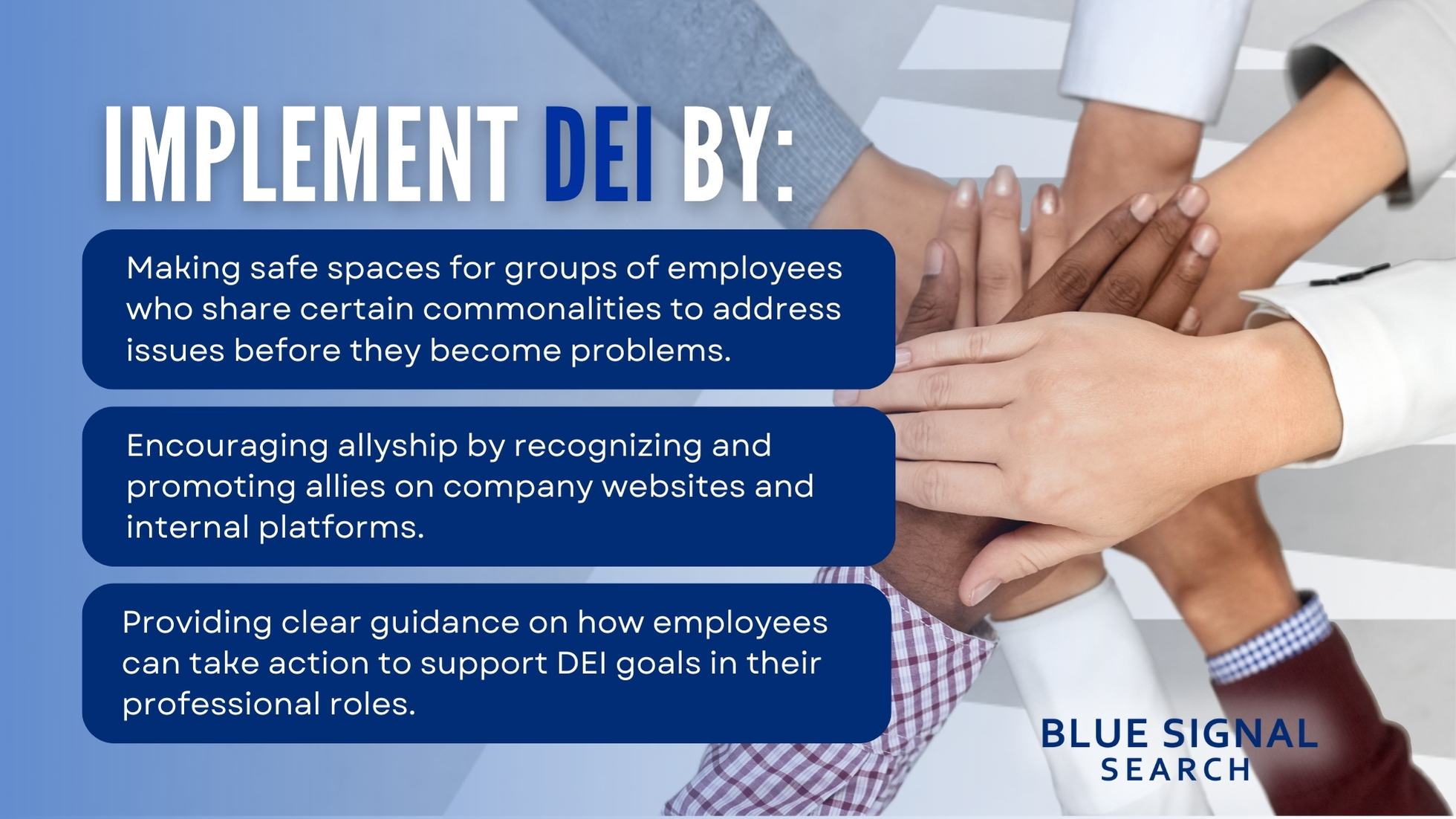As 2024 unfolds, numerous industries are not just surviving—they're thriving. Are you a job seeker on the lookout for a promising career path, or perhaps an employer eager to capture the best talent? Then you have come to the right place. This guide explores sectors bursting with opportunities thanks to technological innovations, green policies, and shifting consumer habits. Let's look closer into the hot growing industries such as Electric Vehicle (EV) batteries, renewable energy, semiconductors, food and beverage, and life sciences. We’ll uncover the key roles shaping these industries, pinpoint the skills that are in hot demand, and offer both job seekers and hiring managers tailored strategies to thrive in these bustling markets. Whether you're planning a career move or looking to strengthen your company’s team, this article provides valuable information on engaging with current industry trends and innovations. Join us as we navigate the dynamic and promising opportunities in the growing industries of 2024. Keep reading to discover how to leverage these insights for career growth and business development.
What Are the Fastest Growing Industries in 2024?
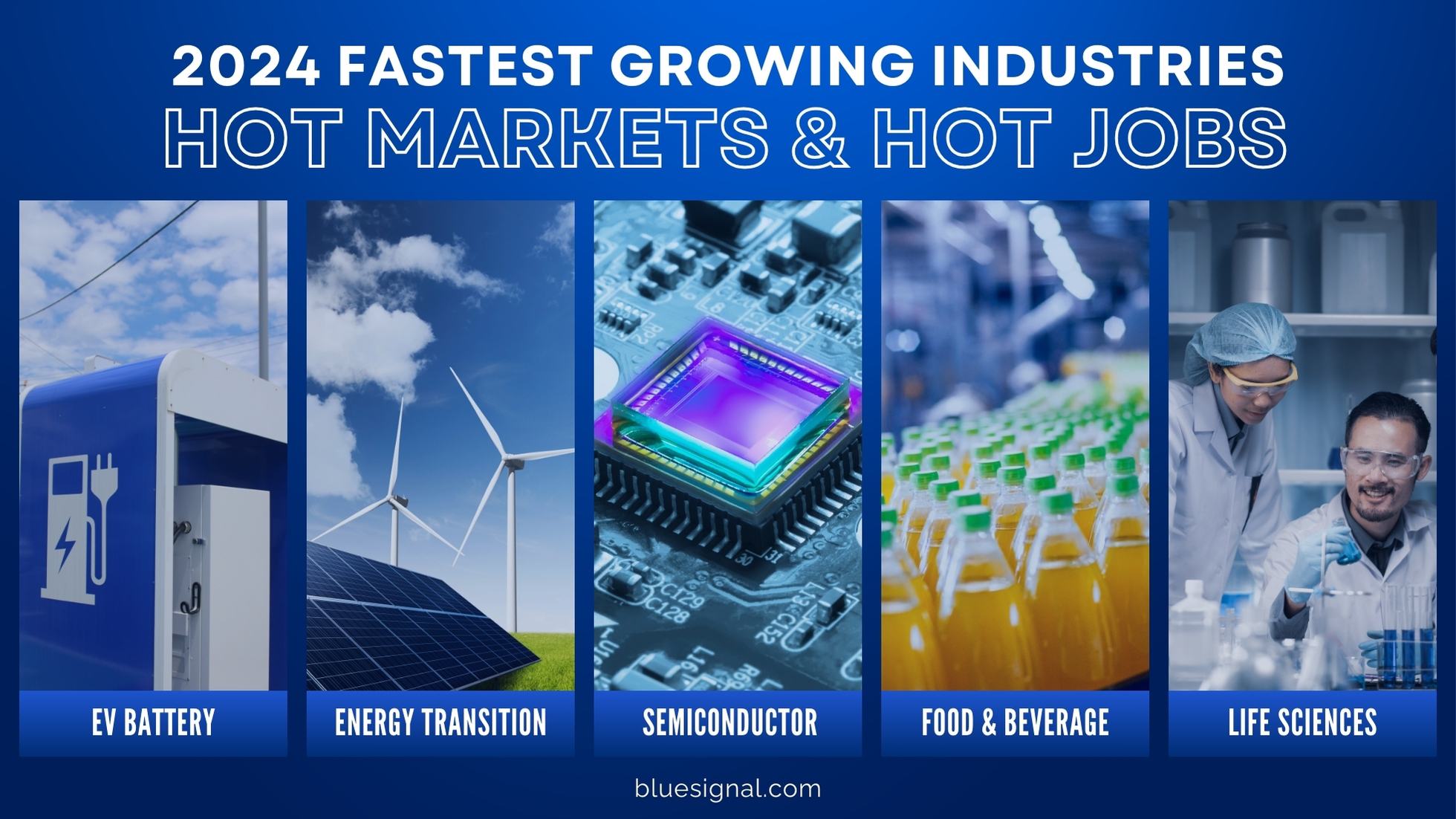
Electric Vehicle (EV) Battery Industry
The market for electric vehicle (EV) batteries, one of the fastest-growing industries, is surging ahead, propelled by stringent environmental policies and cutting-edge technological advancements. As governments worldwide push for reduced carbon emissions, the demand for electric vehicles has skyrocketed, bringing substantial investment into the sector. According to the Environmental Defense Fund, the United States alone has seen investments in EVs soar to $188 billion, promising nearly 200,000 new jobs.
Key Roles and Skills in Demand for EV Battery Production:
As the industry expands, so does the need for specialized talent. The Bureau of Labor Statistics highlights that roles in engineering, battery manufacturing, and software development for battery management systems are particularly in demand. Skills in battery chemistry, electrical engineering, and materials science are crucial for those looking to enter this field. Additionally, as vehicles become more integrated with smart technology, proficiency in AI and machine learning becomes increasingly valuable.

Attracting Specialized Talent for EV Battery Sector:
For hiring managers, the challenge lies in not just finding, but attracting and retaining, the right talent in a fiercely competitive market. The National Resources Defense Council points out that as the demand for EVs grow, so does the market for green jobs within the EV industry, marking it as one of the growing industries with significant employment potential. To stand out, companies need to offer more than just competitive salaries. Emphasizing opportunities for growth, commitment to sustainability, and innovative work environments can be key attractors.
Additionally, partnering with a seasoned recruiter can streamline the process, leveraging their expertise to match your company with candidates who are not only qualified but also passionate about making a difference in the green sector. Business Insider reports that companies are scrambling to fill roles, with some even providing training programs to upskill employees from other industries, showcasing a proactive approach to building the necessary workforce.
For companies in the EV battery industry, it's crucial to communicate not just the technical specifications of the roles but also the larger mission of the company in the green energy landscape. Job seekers are increasingly looking for roles that not only provide a good salary but also align with their values and offer a sense of purpose. By effectively telling your company's story and demonstrating how each role contributes to environmental sustainability, you can attract candidates who are not only skilled but also passionate about their impact on the planet.
Energy Transition Market
Like the EV market, Renewable Energy is one of the fastest growing industries in the world. Energy transition is swiftly becoming a central pillar of global economic growth, propelled by a decisive shift towards renewable energy sources. This sector, vital for its role in combating climate change, is not just transforming our energy landscape but is also a significant driver of job creation. As reported by S&P Global Commodity Insights, the clean energy technology trends of 2024 are setting the stage for substantial growth in green jobs, as industries pivot away from fossil fuels towards more sustainable alternatives like solar, wind, and hydrogen.
Emerging Roles in Renewable Energy:
With the burgeoning emphasis on renewables, new job roles are coming to the forefront in these growing industries, reflecting the market’s evolving needs. According to Powermag, the hydrogen sector is particularly promising, expecting to support numerous positions ranging from technical roles in engineering and IT to specialized positions in hydrogen production and fuel cell technology. Moreover, the surge in solar and wind installations is creating a demand for site managers, maintenance technicians, and logistics coordinators, all crucial for the ongoing operation and expansion of renewable energy facilities.
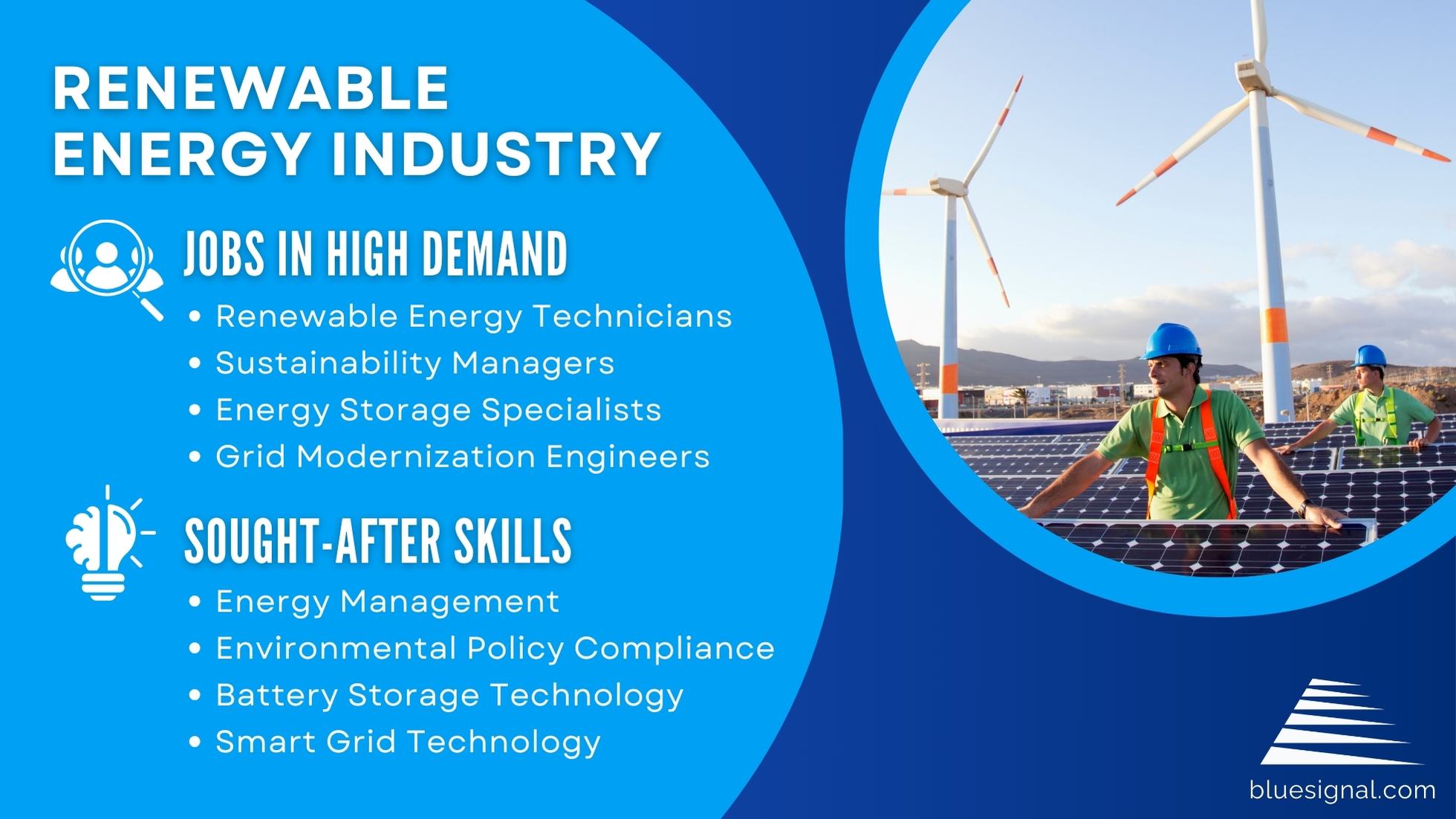
Attracting Specialized Talent in Renewable Energy:
For leaders in the renewable energy sector, attracting and retaining top talent is key to maintaining competitiveness and innovation. Solar Power World Online highlights that as clean energy hiring trends evolve, companies must adapt by fostering a workplace culture that values continuous learning and inclusivity. Emphasizing a mission-driven approach and providing clear career progression paths are effective strategies. Moreover, the U.S. Department of Energy underscores the importance of building teams that are not only technically proficient but also adaptive and forward-thinking. Integrating cross-functional skills and emphasizing interdisciplinary knowledge can empower your workforce to drive the energy sector towards a more sustainable and efficient future.
For hiring managers, the challenge is to not only navigate but also lead in an industry marked by rapid technological advances and regulatory changes. Partnering with recruitment professionals who specialize in the energy sector can provide access to a broader network of qualified candidates. Recruiters can help pinpoint individuals who not only have the necessary technical expertise but are also aligned with the company’s vision for sustainability and innovation. By leveraging these insights, companies can not only contribute to a greener planet but also attract passionate professionals eager to be at the forefront of the energy transition.
Semiconductor Industry
In the semiconductor industry, a significant player among the growing industries this year, there is a substantial expansion fueled by technological advancements and a global surge in demand for electronic devices. This growth is not just reshaping the landscape of technology but also the job market within this sector. Semiconductors form the backbone of our increasingly digital world, embedded in everything from everyday household gadgets to sophisticated industrial systems. According to SEMI's latest report, the industry is poised for substantial growth in 2024, driven by innovations in chip technology and insatiable market demand.
Sought-After Job Positions and Required Skills:
This rapid expansion is creating a high demand for specific roles that are crucial to the industry’s progress. The White House notes a significant comeback in U.S. semiconductor jobs, highlighting the need for skilled process engineers, equipment technicians, and materials scientists. These roles typically require expertise in microelectronics, precision manufacturing, and sometimes, experience in a clean room environment, underscoring the industry’s stringent standards.
Strategies for Hiring in the Semiconductor Industry:
For hiring managers, the challenge lies in assembling a team capable of sustaining innovation and operational excellence in a fast-paced environment. The Semiconductor Industry Association emphasizes the importance of ongoing professional development to bridge any skill gaps. Managers need to foster an environment of continuous learning and adaptability, ensuring their teams are well-equipped to drive technological advancements and respond effectively to industry demands. Engaging a specialized recruiter can greatly enhance a company's ability to attract top talent in this competitive field, connecting them with candidates who not only fit the required technical skill set but who are also a good match for the company's culture and long-term objectives. Learn about more innovative hiring strategies for your semiconductor manufacturing team in our recent blog post here.
Food & Beverage Industry
The Food & Beverage industry, evolving rapidly among growing industries, is undergoing a pivotal transformation driven largely by consumer preferences for sustainable and health-conscious options. This shift is not only influencing product lines—with an increased focus on plant-based and organic products—but also the very nature of career opportunities within the sector. According to Forbes, 2024 will continue to see innovations in food technology and sustainability practices, redefining how products are developed, packaged, and marketed.
Career Opportunities in Food & Beverage:
With the evolution towards sustainable and health-conscious eating, there's a growing demand for professionals across a diverse spectrum—from sustainable agricultural practices to marketing experts who specialize in eco-conscious consumer goods. VegNews reports a surge in plant-based food jobs, indicating a broader trend towards health-oriented food solutions that require new skills and knowledge in both production and promotion.
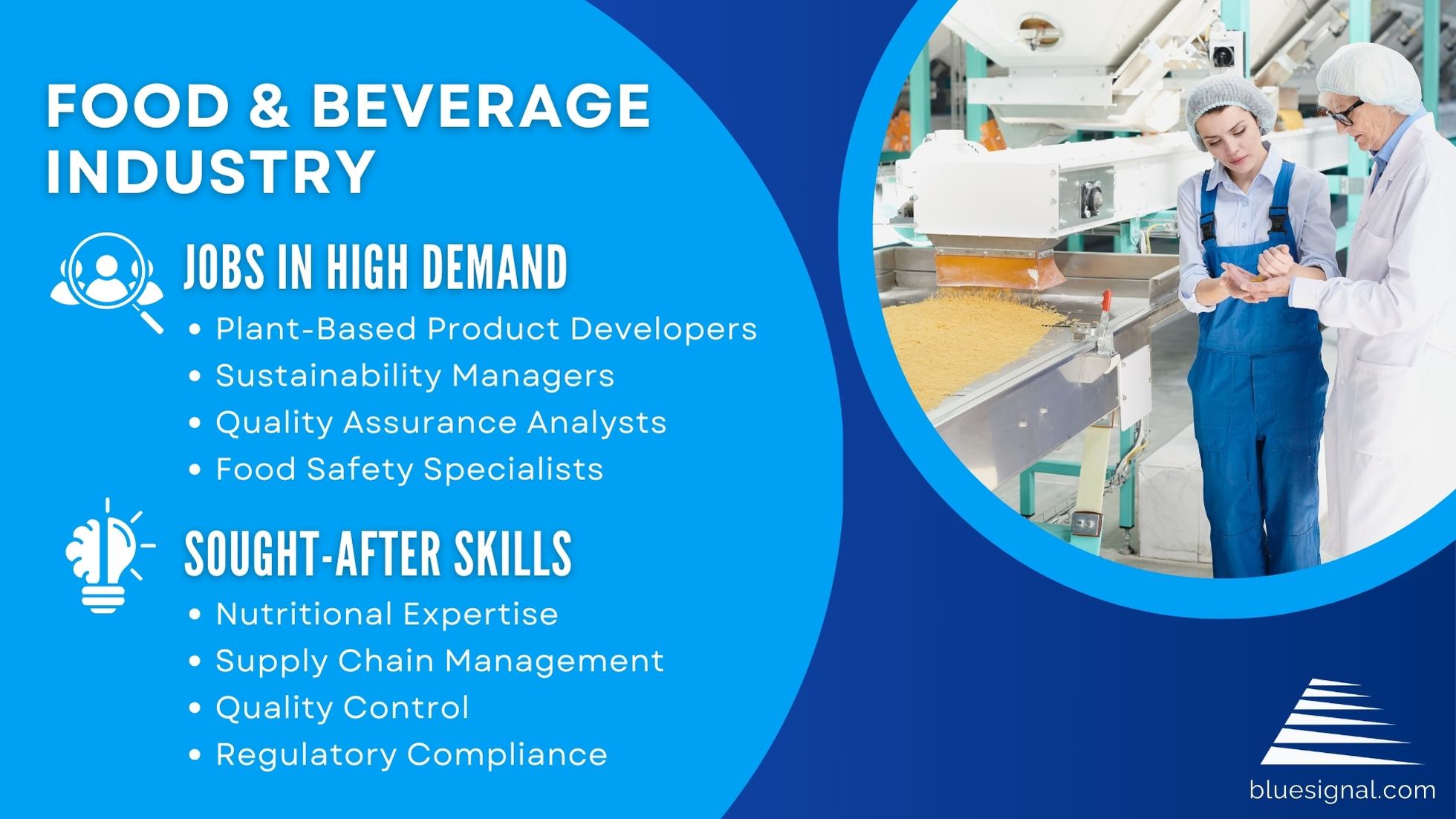
Strategies for Attracting Specialized Talent in Food & Beverage:
For companies in the Food & Beverage industry, adapting to these changes means not only innovating products but also innovating in talent acquisition. Recruiting experts suggest that hiring managers must focus on attracting individuals who are not only skilled but are also aligned with the company's values of sustainability and health. This might include redefining job roles, enhancing company benefits to support a healthier lifestyle, and promoting a corporate culture that values environmental stewardship and community engagement. By integrating these elements into their recruitment strategies, companies can ensure they attract the right talent to drive their business forward in a highly competitive and rapidly evolving market.
Life Sciences Industry
And last on the list for the fastest growing industries in 2024 is Life Sciences. The Life Sciences industry continues to expand significantly, largely propelled by global health challenges that necessitate ongoing innovation in medical research, pharmaceuticals, and biotechnology. This sector's expansion is driven not only by current health needs but also by the broader quest for sustainable and advanced healthcare solutions. Additional growing subsectors of life sciences include medical communications and pharma advertising. The demand for specialized talent to tackle complex biological and health-related problems is increasing, reflecting the industry's dynamic evolution.
Career Opportunities in Life Sciences:
For those looking to enter or advance within the Life Sciences sector, there are burgeoning opportunities in research, pharmaceutical development, and biotechnology. According to Labiotech, the biotech job market in 2024 is vibrant, with a particular demand for roles in genetic engineering, clinical research, and regulatory affairs. Insights from a recent interview with Blue Signal recruiting expert Kelsey Campion revealed an increased need for roles such as clinical trial managers, bioinformaticians, and biostatisticians, who are crucial for driving advancements in biotechnology and pharmaceuticals.
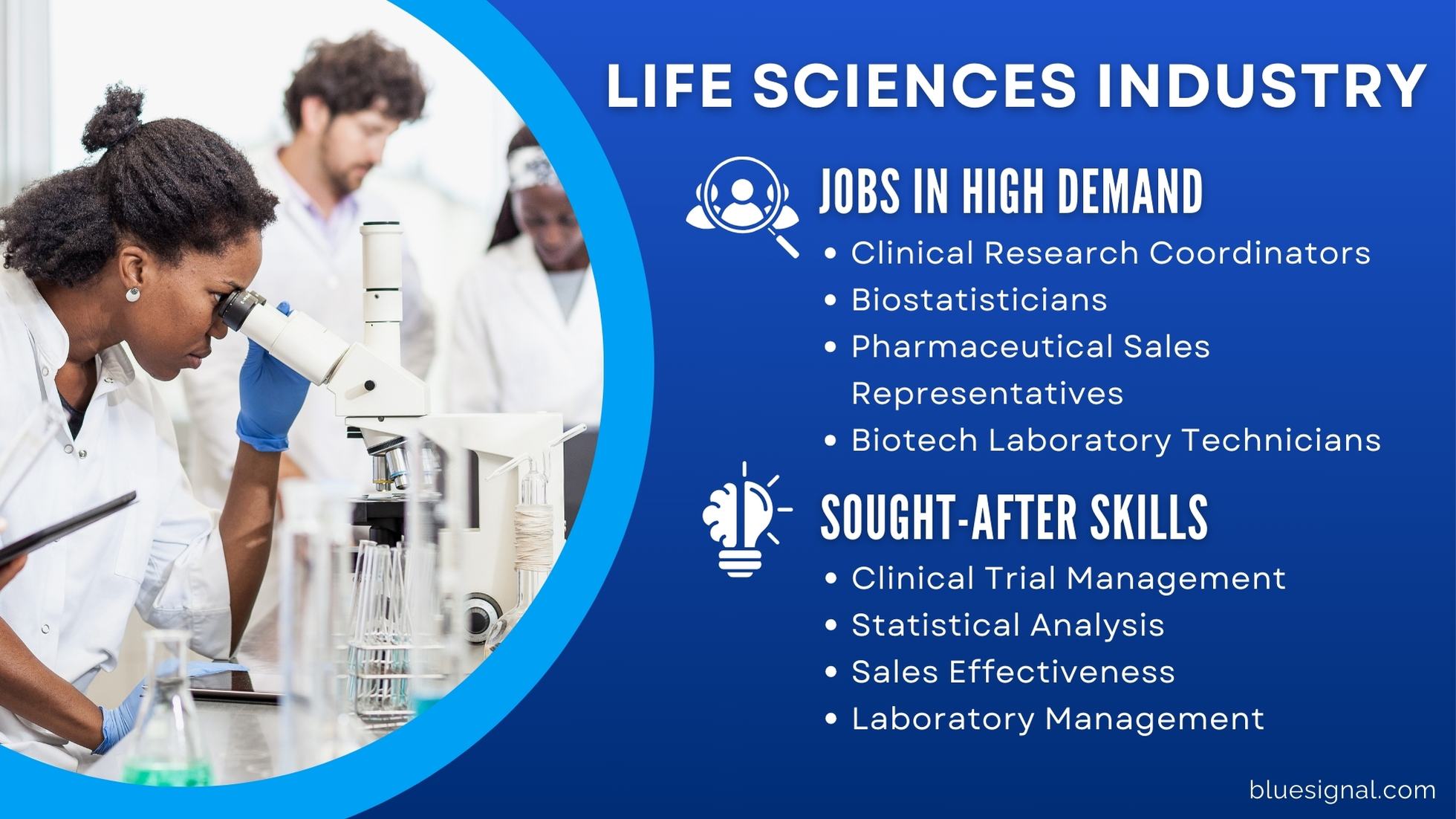
Strategies for Sourcing and Retaining Experts in Life Sciences:
For hiring managers, the challenge in the Life Sciences industry lies in attracting and retaining top talent amidst intense competition. Pharma Exec emphasizes the importance of understanding the shifting landscape of the job market, suggesting that companies need to offer clear career progression, competitive salaries, and opportunities for impactful work to attract the right experts. Additionally, insights from our 2023 hiring data suggest incorporating flexible work models and emphasizing a collaborative culture to retain skilled professionals who are increasingly looking for balance and innovation-driven environments. Partnering with a specialized recruiter can significantly streamline this process, offering access to a vast network of qualified candidates and delivering tailored strategies to meet both immediate hiring needs and long-term goals. By effectively scouting and retaining skilled professionals, companies can ensure they remain at the forefront of innovation and capable of addressing the evolving health challenges that define the global landscape.
In Conclusion
As we conclude our overview of the fastest growing industries this year, it's clear that the sectors we've highlighted are just a fraction of the areas where growth and innovation are creating vibrant opportunities. By staying informed about these trends and collaborating with specialized recruitment professionals, both companies and candidates can more effectively navigate the complexities of the job market.
At Blue Signal, we are committed to your success. Whether you’re a professional looking to advance in one of these thriving industries or an employer seeking to attract and retain the best talent, we are here to support and guide you every step of the way.
Why Partner with Blue Signal?
Our approach is tailored and strategic. We don’t just fill positions—we help you build the teams that will lead your company into the future. With a deep understanding of each industry’s unique challenges and opportunities, Blue Signal’s recruiters leverage their extensive networks and the latest market intelligence to connect you with candidates who not only meet the skill requirements of the role but also align with your company’s culture and long-term goals.
Ready to enhance your recruitment strategy and secure top talent in these growing industries? Contact Blue Signal today. Our experts are ready to help you navigate the complexities of hiring in these competitive fields, ensuring you attract and retain the best talent to drive your business forward. Let's build the future together.
Partner with us for your next hire.
Set up a free consultation with a recruiting manager. Tell us about your hiring need.
By submitting this form, you consent to receive communications from Blue Signal, including phone calls, emails, and text messages.



